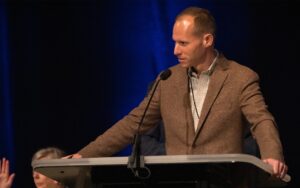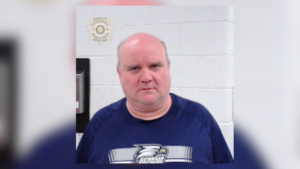
NASHVILLE (BP) — Christians in an increasingly secularized society face the challenge of evangelizing people in a culture that does not know the right questions nor answers, Russell D. Moore said in his report to the Ethics & Religious Liberty Commission’s trustees.
The church must realize it is living in a new day in America, the ERLC president said Sept. 17 during the trustees’ annual meeting in Nashville.
Christians are called “to speak in a way that exposes and shows lostness … in order to get to the Gospel of Jesus Christ,” Moore said in contrasting the accounts of Jesus’ encounters with Nicodemus in John 3 and the Samaritan woman at the well in John 4.
Nicodemus came to Jesus at night as a religious leader who knew the Bible, sought to please God and was fearful of being expelled from the synagogue, Moore said. Nicodemus “had a religion to lose. … He did not want to be seen to be something other than a moral, upstanding person in the community.”
The woman at the well and Jesus, however, conversed in the middle of the day. “[S]he has nothing to lose,” Moore said. “She is already an outcast from respectable society. She is already somebody who is known to the people around her as lost.”
With both Nicodemus and the woman, Jesus “forces the crisis where the idols are exposed so that the only answer that can be left is Him,” Moore said.
“He does not see Nicodemus as too good for the Gospel,” Moore said. “And He does not see the woman at the well as too bad for the Gospel.”
With the woman, Jesus “speaks to her thirst, and Jesus does this in the way a Nicodemus culture would not understand,” Moore said. A Nicodemus culture would be glad simply if the woman would talk properly to a Jew, lived a moral life or if she were not a Samaritan, Moore said.
In John 4, Jesus speaks “of ethics, of morality,” Moore said, when He asks about the woman’s husband and then reveals she has been married five times and now lives with a man to whom she is not married.
Jesus “is exposing lostness, but He is not doing that to shame her, to drive her away, to condemn her,” Moore said, noting that Jesus “does this in order to point her to Him, to the Gospel. Jesus is not provoking conflict for the sake of conflict. He is disclosing Himself.”
Moore called Christians not to give an incomplete message.
“We are ambassadors of reconciliation who are speaking a message that exposes sin, that exposes lostness but doesn’t stop there,” he said. “We are not the union reps for the fellowship of the outraged.”
Citing John 3:16, Moore said Christians are to proclaim “the message — whether in a Nicodemus culture or in a woman-at-the-well culture — God so loved the world that he gave His only begotten Son that … whoever believes will have water that not only satisfies the thirst but never stops running. ”
Christians should not wring their hands or revert to nostalgia, Moore said.
“You and I are moving into a time in every single one of our communities [when] we are going to have people who have believed all of the promises of the sexual revolution, who will have believed all of the promises of the technological revolution, and we are going to have people who are deeply wounded and burned over and even numb because sin cannot keep the promises it makes,” he said. “The answer though for us is to recognize that the water people are drawing around us will not satisfy.”
Some Christians may fear that those who embrace the sexual revolution are somehow “beyond the reach of the Gospel because they’re in the thralls of a happiness that will satisfy,” he said. “The Gospel of Jesus Christ knows different. People are not satisfied by this.”
During the last year, he told trustees, the ERLC has sought to fulfill its mission of equipping churches “to be able to think in terms of the Gospel and to think in terms of a Gospel that does not simply believe but a Gospel that works itself out, as the apostle Paul says, in love.”















